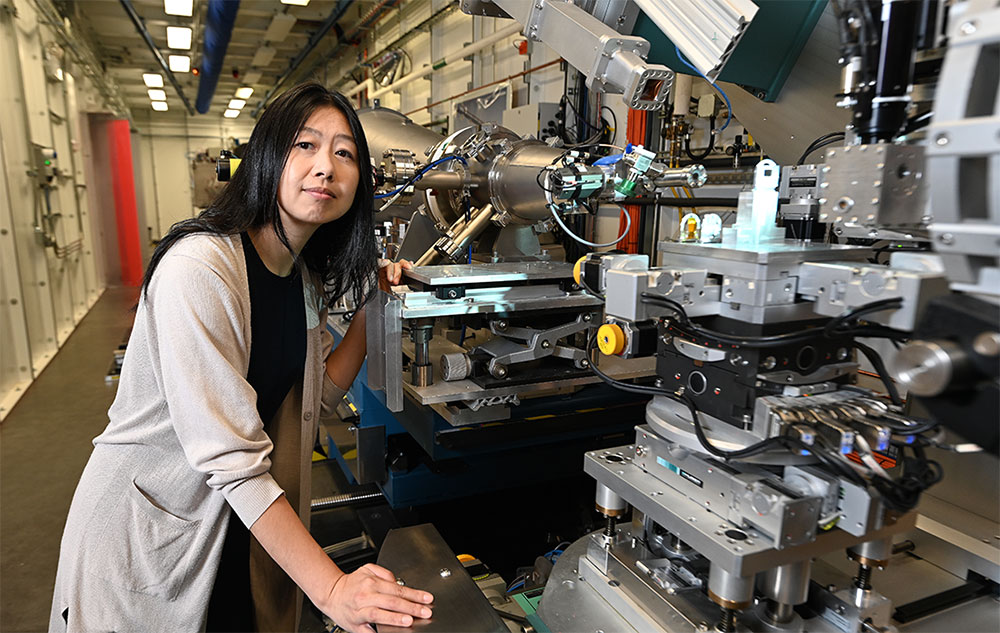Xiaoqian Chen Earns DOE Early Career Award for Quantum Materials Research
Chen's research on materials with quantum behaviors would provide new insights into quantum entanglement
September 26, 2024
 enlarge
enlarge
Xiaoqian Chen, physicist and beamline scientist, at the Coherent Hard X-ray Scattering beamline. (Kevin Coughlin/Brookhaven National Laboratory)
UPTON, N.Y. — Xiaoqian Chen, a physicist and beamline scientist at the National Synchrotron Light Source II (NSLS-II), a U.S. Department of Energy (DOE) Office of Science User Facility at DOE’s Brookhaven National Laboratory, has been selected as one of the 91 early career scientists from across the country to receive research funding through the DOE Office of Science’s Early Career Research Program. This funding will aid Chen in researching the unique ways that particles interact to share information due to quantum mechanics.
“Investing in cutting-edge research and science is a cornerstone of DOE's mission and essential to maintaining America’s role as a global innovation leader,” said U.S. Secretary of Energy Jennifer M. Granholm. “The Biden-Harris administration is funding scientists and researchers at our nation’s national labs and universities, early in their careers, ensuring they have the resources to expand scientific discovery and pursue solutions to some of the most complex questions.”
The award includes five years of funding support for Chen. She will use this funding to study quantum correlations in condensed matter at NSLS-II’s Coherent Hard X-ray Scattering (CHX) beamline. This research will explore the way particles interact in a quantum system that can’t be explained by classical physics. In classical physics, particles behave independently, but in a quantum many-body system, particles can become “entangled,” meaning the behavior of one particle could be linked to the behavior of other particles. Understanding quantum correlations in many-body systems could have implications in quantum computing, quantum simulations, materials science, and metrology.
“When two particles are quantum entangled,” explained Chen, “if you know the information from one particle, you know the information from the other. People have been trying to detect and quantify quantum entanglement in condensed matter systems – systems with about 100 sextillion electrons. Researchers have successfully demonstrated entanglement within a small number of particles, but the idea of my proposal is to extend that to real materials using a technique called coherent X-ray scattering. In this technique, we use photons that travel as coherent waves, which basically can act as a microscope that tracks how fast the electronic inhomogeneities are moving inside materials. This gives us a clue to the degree of entanglement in materials.”
This work builds on research that Chen has been doing for several years. After gaining experience in two postdoctoral roles, including one in the X-ray scattering group in Brookhaven’s Condensed Matter Physics & Materials Science Department, she was offered a position at CHX to lead their quantum materials research program.
“This project focuses on one of the Lab’s high-priority research initiatives,” explained Andrei Fluerasu, the lead beamline scientist at CHX. “Xiao's research takes direct advantage of the unmatched properties of the NSLS-II source paired with the unique features of the beamline to provide a new window into the nanoscale behavior of quantum materials. Her efforts have also led to an increase in users from academia and national labs who are now using the CHX beamline. Her program has tremendous potential to be very impactful in this burgeoning field of research and continue to help develop an increasingly stronger user community.”
The Early Career Research Program bolsters the nation’s scientific workforce by supporting exceptional researchers at the outset of their careers, when many scientists do their most formative work. Chen echoed the importance of this award but also the benefits of the process itself.
“It’s really important for all early career scientists to prepare a solid proposal,” said Chen. “Creating it can help clarify the direction of a scientist’s career. Brookhaven Lab’s deputy director for science and technology, John Hill, stressed this when he met with several early career scientists from around the Lab. I came away realizing that it's really about what you learn, think, and write — and the community you build during the writing process. What really matters, in some sense, for what you're going to carry out for the next five years, even if you don't get the funding, is having that plan laid out in front you. I feel a lot more confident starting this work with a clear map of where I’m going.”
About the DOE Early Career Research Program
DOE’s Early Career Research Program, since its inception, has made 961 funding awards, including 631 awards to universities and 330 awards to national laboratories.
To be eligible for the DOE award, a researcher must be an untenured, tenure-track assistant, or associate professor at a U.S. academic institution or a full-time employee at a DOE national laboratory who received a Ph.D. within the past 10 years. Research topics are required to fall within one of the DOE Office of Science's eight major program offices:
Accelerator R&D and Production
Advanced Scientific Computing Research
Basic Energy Sciences
Biological and Environmental Research
Fusion Energy Sciences
High Energy Physics
Isotope R&D and Production
Nuclear Physics
This year’s awardees were selected from a large pool of university- and national laboratory-based applicants. Selection was based on peer review by outside scientific experts. Projects that have been announced are selections for negotiation of financial award. The final details for each project award are subject to final grant and contract negotiations between DOE and the awardees.
A list of the 91 awardees, their institutions, and titles of research projects is available on the Early Career Research Program webpage.
Brookhaven National Laboratory is supported by the Office of Science of the U.S. Department of Energy. The Office of Science is the single largest supporter of basic research in the physical sciences in the United States and is working to address some of the most pressing challenges of our time. For more information, visit science.energy.gov.
Follow @BrookhavenLab on social media. Find us on Instagram, LinkedIn, X, and Facebook.
2024-22083 | INT/EXT | Newsroom









